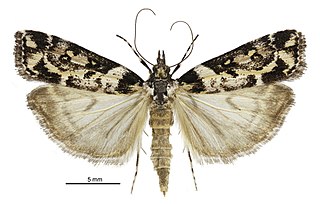
Chilades lajus, the lime blue, is a small butterfly found in India, Sri Lanka, Myanmar, Taiwan, Hong Kong, Hainan, Mangulam Island, Sulawesi and the Philippines that belongs to the lycaenids or blues family.

Dophla evelina, the red-spot duke, is a species of brush-footed butterfly found in Cambodia and South and Southeast Asia. Many subspecies are accepted. The species was first described by Caspar Stoll in 1790.

Pantoporia hordonia, the common lascar, is a species of nymphalid butterfly found in Cambodia, tropical and subtropical Asia.
Porpodryas is a genus of moth in the family Gelechiidae. It contains the species Porpodryas prasinantha, which is found in French Guiana.

Pyrausta despicata, the straw-barred pearl, is a species of moth of the family Crambidae. It was described by Giovanni Antonio Scopoli in his 1763 Entomologia Carniolica.

Scoparia subfusca is a species of moth of the family Crambidae. It is found in Europe.

Eudonia diphtheralis is a species of moth in the family Crambidae. It is endemic to New Zealand.
Scieropepla obfuscata is a moth of the family Oecophoridae. It was described by Edward Meyrick in 1921. It is found in Queensland, Australia.
Battaristis syngraphopa is a moth of the family Gelechiidae. It was described by Edward Meyrick in 1922. It is found in Brazil and Peru.
Compsolechia thysanora is a moth of the family Gelechiidae. It was described by Edward Meyrick in 1914. It is found in Peru.
Compsolechia pungens is a moth of the family Gelechiidae. It was described by Edward Meyrick in 1922. It is found in Peru.
Antaeotricha lignicolor is a species of moth of the family Depressariidae. It is found in Peru and Colombia.
Agriophara parilis is a moth of the family Depressariidae. It is found in New Guinea.
Agriophara neoxanta is a moth in the family Depressariidae. It was described by Edward Meyrick in 1915. It is found in New Guinea and Australia, where it has been recorded from Queensland.
Antaeotricha milictis is a moth in the family Depressariidae. It was described by Edward Meyrick in 1925. It is found in Colombia and Brazil.
Antaeotricha encyclia is a species of moth in the family Depressariidae. It was described by Edward Meyrick in 1915. It is found in Colombia.
Antaeotricha platydesma is a moth in the family Depressariidae. It was described by Edward Meyrick in 1915. It is found in Guyana.
Imma halonitis is a moth in the family Immidae. It was described by Edward Meyrick in 1920. It is found in Chennai, India.
Moca mitrodeta is a moth in the family Immidae. It was described by Edward Meyrick in 1922. It is found in Peru.
Imma eriospila is a species of moth in the family Immidae. It was described by Edward Meyrick in 1922. It is found in Pará, Brazil.





